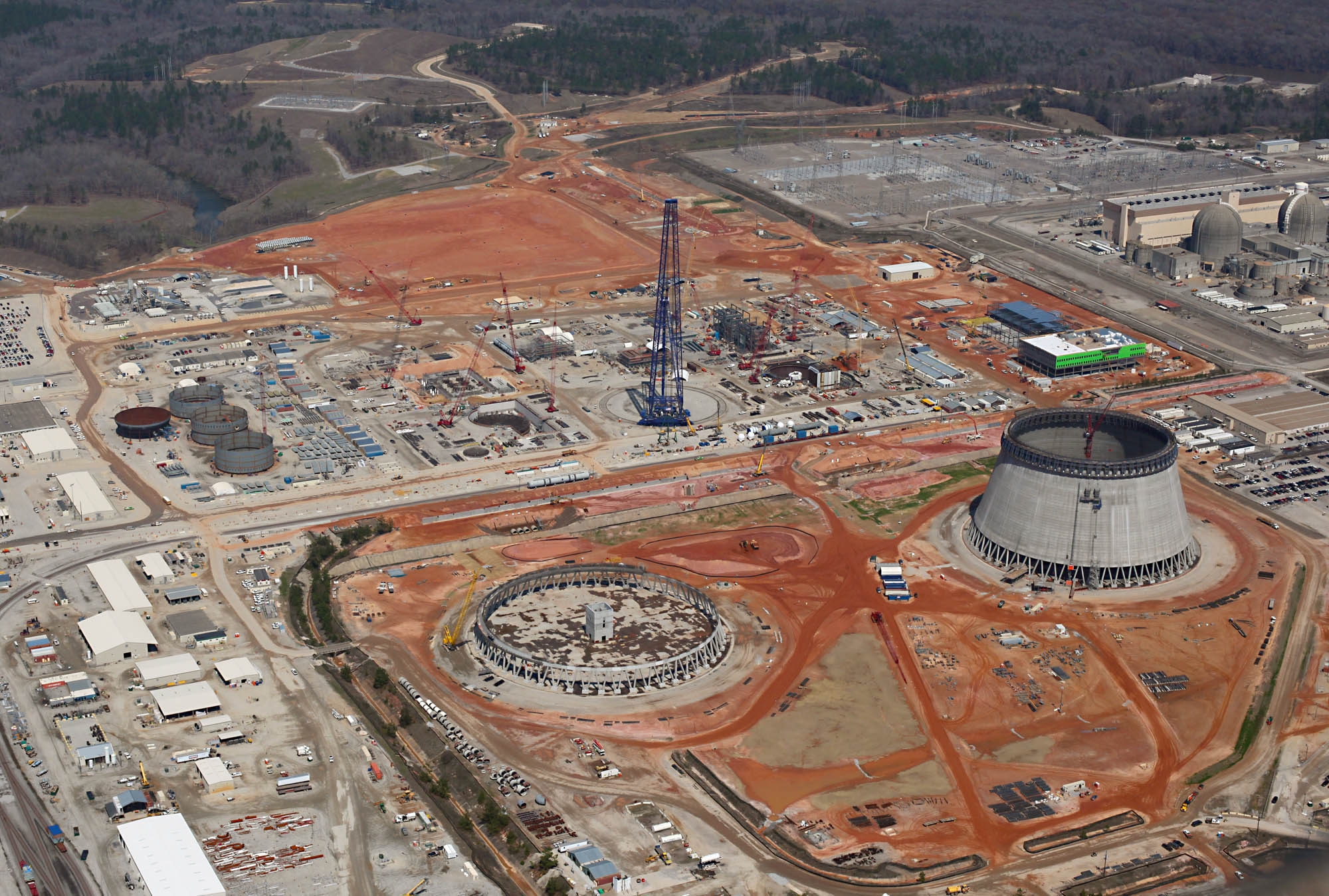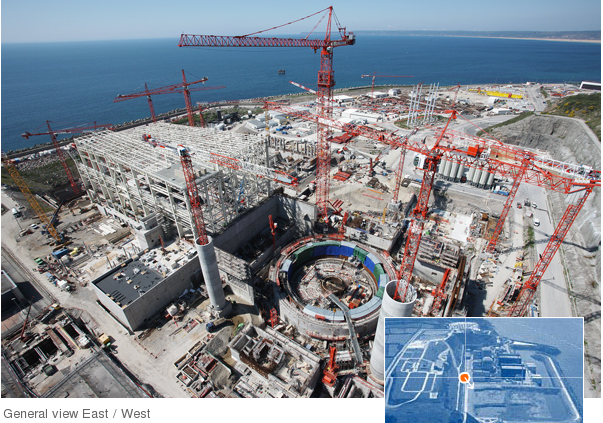
It’s Thanksgiving week here in the U.S., what better time to take a look at some of the real turkeys in the nuclear power business?
We don’t have to go back far, however. All of these turkeys took place just this week!
Vogtle delayed again
The Georgia Public Service Commission was told Monday by the monitors it hired to keep tabs on the construction of the two new Vogtle reactors on the Savannah River that the project has fallen further behind schedule and will not even meet its revised schedule of commercial operation by the end of 2017 for the first unit and end of 2018 for the second unit.
In fact, the Atlanta Journal-Constitution (subscription only, unfortunately) quoted one of the monitors as saying “it is impossible to determine” when either reactor will be ready for commercial operation.
Earlier this year, the monitors had told the PSC that the consortium, led by Southern Company, building the reactors faced “many challenges” in meeting its schedule. Those challenges now appear to have become roadblocks.
“For most activities the consortium has missed critical milestone dates and some forecast milestone completion dates continue to slip,” the testimony said. While the exact nature of the construction milestones was redacted, the testimony shows that steps needed to elevate the nuclear island foundation to a level where one of the key pieces of plant infrastructure, the shield building, can be installed may be delayed by as much as 408 days. The previous testimony showed 317 days as the largest possible delay for one of these redacted milestones.
There will be a cost to the delays, of course, estimated at $2 million/day. And so nuclear history repeats itself–predictably and assuredly as farce.
More insider trading at Entergy
In the most read story ever on GreenWorld, we broke the news last April about an unusual amount of stock sales of Entergy stock by its own top executives, and followed up in June with a report of another top executive selling his stock.
Now comes two more cases of top execs selling their own company’s stock. Exec Phillip May sold about 40% of his share of Entergy stock, for a tidy $336,200 last week. Ted Bunting let go a smaller percentage–about 15%–of his stock and walked off with $162,268.90 on Friday.
Once again, we have to ask: what do these Entergy executives know that we–and the public at large–don’t know? Or is it just the obvious: that Entergy went in big on nuclear power and it has come back to haunt them, with more and bigger reactor shutdowns on the way?
Exelon doesn’t just want a bailout, it wants permanent profit

Exelon continues to threaten (or promise, depending on how you look at it) to close its uneconomic reactors at Quad Cities, Clinton and Byron, Illinois. In this case, the Nuclear Energy Institute tagged along at a Monday meeting with the editorial board of Illinois’ Dispatch/Rock Island Argus–which apparently has never been taught the journalistic tenets of how to ask tough questions and to not necessarily accept the first answer that drools out of a company flack’s mouth.
The company says it will make a decision by June, which, the flack says, will give “state lawmakers time to study the market and find solutions.” Solutions for Exelon, of course, not the public…
The flack, a PR guy at Quad Cities named William Stoermer, repeated the Exelon mantra: “We are not looking for a bailout.”
Of course not. What Exelon wants is far, so far from a bailout: “He said they want lawmakers to create a model to regulate a fair and equitable marketplace, identify what needs to be done to improve the grid and recognize nuclear power is a carbon-free source of energy.”
In other words, Exelon wants to be assured a permanent profit to give Illinois the privilege of receiving electricity from a bunch of aging, uneconomic reactors.
The real kicker comes later in the story, when the NEI guy says that if the reactors were shut down, “the energy needed for those homes would come from somewhere, but likely would cost more and be generated from a source producing more carbon emissions.”
But the entire reason the reactors are uneconomic is that they can’t compete price-wise with the competition (primarily rapidly growing wind power and natural gas). So it is extremely improbable that power would cost more, since it already costs less than the reactors can provide.
Since the lights have stayed on throughout Illinois, it’s pretty safe to say their power hasn’t really been needed much either. And to the extent power is needed, it is far more likely to come from wind and solar power–and, if Illinois put its mind to it, energy efficiency–all of which would actually cause reduced carbon emissions nationally, if not in Illinois itself. Which shouldn’t matter–we all live on the same planet.
It’s the same all over
Back in 1968 Canned Heat toured the world for the first time, came back to the U.S. and wrote a great song called “Same All Over,” which was about the fact that the hippie revolution was indeed taking place all over the globe.
It’s a far different era, and a subject even further removed, but in the nuclear power business the Same All Over mantra applies.

Just as Exelon, Entergy, Duke and the rest of the big U.S. nuclear utilities are trying desperately to hold on to their increasingly decrepit reactors that can no longer turn a profit, so too is Electricite de France looking for government help to keep its aging reactor fleet operating.
Here’s the first paragraph of Bloomberg’s piece yesterday on incoming EDF CEO Jean-Bernard Levy: “Electricite de France SA’s new chief pleaded with lawmakers for higher power tariffs to improve the finances of the state utility and its fleet of aging reactors.”
Yep, its the same all over: the aging reactor syndrome is accompanied by the utility rate hike (or some other form of bailout) syndrome. Not only as Southern Company is proving at Vogtle, EDF is proving at its new reactor project in Flamanville, France and Areva has proven over and over again in Finland are new reactors too expensive to build, but as reactors age and require more and more maintenance and safety upgrades as a result of disasters like Fukushima, they too become uneconomic–even when the reactors themselves are fully paid for. Too uneconomic to compete with the continually plummeting costs of renewables and the near-negative cost of energy efficiency.
And that, my friends, is how the nuclear power age will end–by being forced to price itself out of existence.
Take that thought with you as you give thanks this week.
We too will be giving thanks for that these next few days; we expect to return on Monday.
Michael Mariotte
November 26, 2014
Permalink: https://www.nirs.org/2014/11/26/some-real-turkey-week-turkeys/
Your contributions make publication of GreenWorld possible. If you value GreenWorld, please make a tax-deductible donation here and ensure our continued publication. We gratefully appreciate every donation of any size.
Comments are welcome on all GreenWorld posts! Say your piece above. Start a discussion. Don’t be shy; this blog is for you.
If you’d like to receive GreenWorld via e-mail, send your name and e-mail address to nirs@nirs.org and we’ll send you an invitation. Note that the invitation will come from a GreenWorld@wordpress.com address and not a nirs.org address, so watch for it.
If you like GreenWorld, you can help us reach more people. Just use the icons below to “like” our posts and to share them on the various social networking sites you use. And if you don’t like GreenWorld, please let us know that too. Send an e-mail with your comments/complaints/compliments to nirs@nirs.org. Thank you!
GreenWorld is crossposted on tumblr at https://www.tumblr.com/blog/nirsnet



